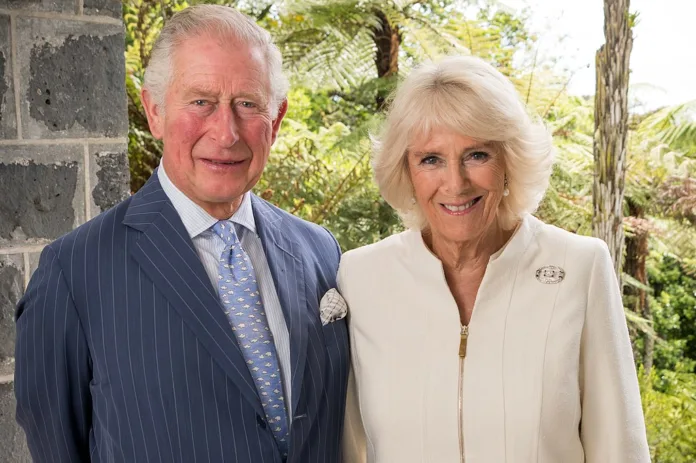Simon Dorante-Day, confident in his royal ancestry, plans legal action during King Charles and Queen Camilla’s upcoming visit to Australia
Simon Dorante-Day, an Australian from Queensland, believes he is the secret son of King Charles III and Queen Camilla. Dorante-Day, originally from Britain, claims that a DNA test will prove his royal lineage. He plans to pursue legal action when the King and Queen visit Australia in October.
Dorante-Day, born in Gosport, Portsmouth in 1966, was adopted by Karen and David Day at eight months old. His adoptive grandparents, Winifred and Ernest Bowlden, previously worked for the Queen and Prince Philip, with Ernest receiving an Imperial Service Award. Dorante-Day points to physical attributes such as facial features, hands, and hair colour as evidence supporting his claim.
In an interview with 7News, Dorante-Day emphasized his confidence in his findings. He stated, “I’m 100 percent confident that I will have the answers.” He has spent years investigating his parentage and, along with his wife Dr. Elvianna Dorante-Day, has been collecting evidence. He remains secretive about his legal strategy, stating, “I’d be a very silly person not to take action when he comes into the same jurisdiction as me. But I think I’d be even sillier to reveal my hand prematurely.”
Buckingham Palace has not publicly addressed Dorante-Day’s assertions. He insists that his efforts are not for “money or fame” but to uncover the truth about his identity. According to Dorante-Day’s research, Charles and Camilla formed a close bond in 1965. He contends that during the period leading up to his birth, Camilla disappeared from the social scene in the UK for approximately nine months while Charles was sent to Australia.
Dorante-Day’s claims have drawn significant media attention, especially with the upcoming royal visit to Australia. He hopes that a DNA test will confirm his assertions and bring to light the truth of his origins.
Analysis:
The claim by Simon Dorante-Day that he is the secret love child of King Charles III and Queen Camilla presents a sensational and potentially impactful situation, touching upon several dimensions, including legal, social, and royal family dynamics.
Legally, Dorante-Day’s pursuit of a DNA test and subsequent legal action during the royal visit to Australia raises questions about jurisdiction and the legal process involved in such claims. If Dorante-Day successfully initiates legal proceedings, it could set a precedent for similar claims against high-profile figures. The legal framework for addressing such claims, especially against royalty, involves complex international law considerations, given the differing legal systems and diplomatic protections.
Socially, Dorante-Day’s claims highlight issues of identity and the search for personal truth. Adoption and the quest to uncover biological roots resonate with many individuals worldwide, reflecting broader themes of belonging and self-discovery. His assertions also touch upon the transparency and openness of public figures regarding personal histories, especially when these figures hold significant societal influence.
For the royal family, this claim adds a layer of scrutiny and public interest, potentially affecting their public image. The British monarchy, a symbol of tradition and continuity, may find such allegations challenging to manage. The royal family’s response, or lack thereof, to these claims, could influence public perception, either reinforcing their stature or raising questions about their past actions and transparency.
The media’s role in amplifying Dorante-Day’s claims cannot be overlooked. Sensational stories involving the royal family attract considerable attention, often leading to extensive media coverage. The narrative surrounding Dorante-Day’s search for truth taps into public fascination with royal affairs and personal drama, potentially overshadowing other significant issues.
Psychologically, the impact on Dorante-Day himself is substantial. The pursuit of such a claim involves emotional and mental challenges, navigating public opinion, legal battles, and personal identity issues. His confidence in his findings and determination to pursue legal action suggest a deeply personal quest for recognition and acceptance.
From a historical perspective, claims of secret relationships and hidden offspring within royal families are not new. History is replete with similar allegations, some of which have significantly influenced public opinion and royal dynamics. The resolution of such claims, whether through legal means or public acknowledgement, often shapes the narrative surrounding historical and contemporary figures.
In conclusion, Simon Dorante-Day’s claim to be the secret love child of King Charles III and Queen Camilla presents a multifaceted issue involving legal challenges, social implications, and royal family dynamics. The outcome of his pursuit for a DNA test and potential legal action will be closely watched, influencing public perception and potentially uncovering new aspects of royal history.
